Ebikes, despite the fact that they have been known for a very long time, have only been gaining popularity in Poland in the last few years, and the number of users is growing at an increasingly rapid pace. What makes them so many enthusiasts? It’s quite simple, ebike is a means of transport, which combines the best features of scooters and bikes – it’s ecological, helps to take care of the condition, helps to avoid traffic jams, makes it easier to ride during troublesome hills and doesn’t make any noise, but this sweetening is enough :), let’s get to the point.
The base of the ebike is the motor and of course the battery, which is the subject of this article. As in the title, we will answer the question – how to choose a battery for ebike? Depending on whether you replace the battery in your ebike or convert a traditional bike to an electric one, after reading this article you should know everything about choosing the right battery model.

We would like to point out that this article only applies to ebikes of the “pedelec” type, i.e. those with electric propulsion activated by pressing the pedals. This is commonly used ebike technology. The article does NOT apply to models equipped with manual drive (cuff).
Step by step selection of batteries for ebike
1. Voltage
The ebike motors are factory adapted to the specific battery voltage they work with, so our job is simply to match one to another. Admittedly, if the motor controller allows it, in some cases it is possible to work with e.g. 36V motor and 48V battery, but this is not a recommended configuration and applies to non-standard ebike models, so we mention this only as a curiosity. So the principle is simple – what kind of motor voltage such a battery voltage.
2. Input in the bike, which is the type of socket
The issue is quite clear. Please pay attention to what type of input is in our ebike and choose a battery with the appropriate version. The most common type of connection is 4-pin, which looks like this:
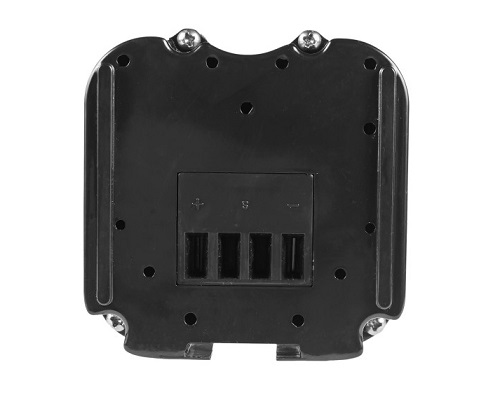
3. The shape of the battery, the type of attachment and dimensions
We have to answer the question: what does our battery look like and where do we mount it on our bike? If we replace the battery, it is quite simple – we choose the shape we had before. But if we build an ebike ourselves, we face a serious dilemma. There are many types of batteries for ebikes, so below I will list the most common ones:
Silverfish batteries – this is the most popular type of battery for a bicycle, but the ways of mounting it can be different. Depending on the bike, it can be placed together with the bottom or rear of the frame, or even on the trunk. The form shown below is the most common.
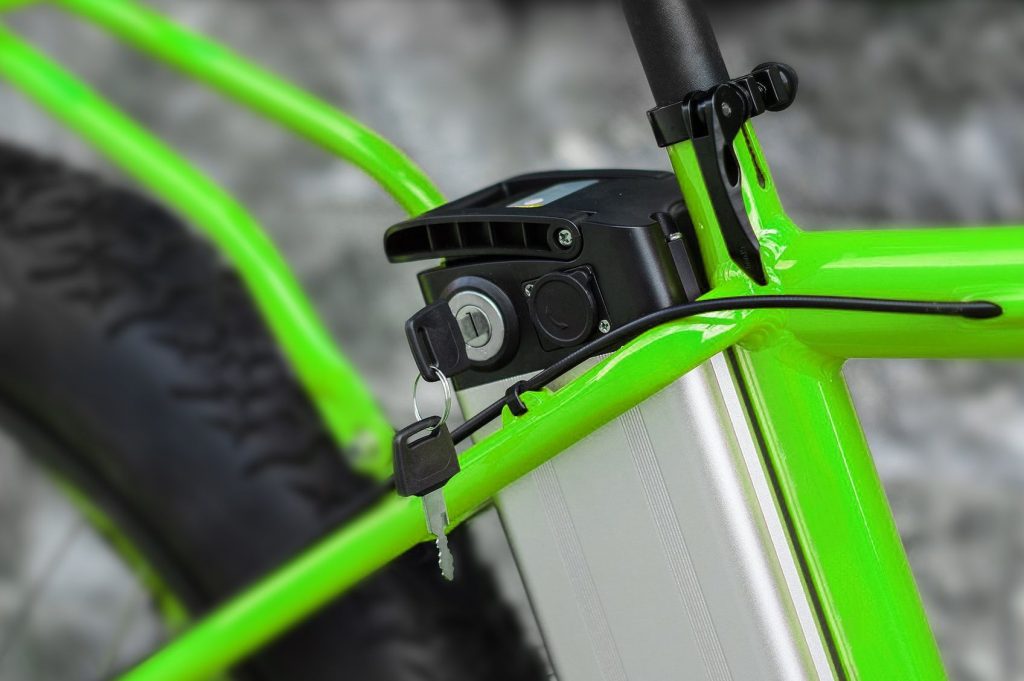
Bottle batteries – a type similar in shape to Silverfish and different mounting methods are also possible, but the so-called bottle mounting is commonly used. The name obviously indicates the place 🙂.

Down Tube batteries – almost exclusively for bottle mounting.
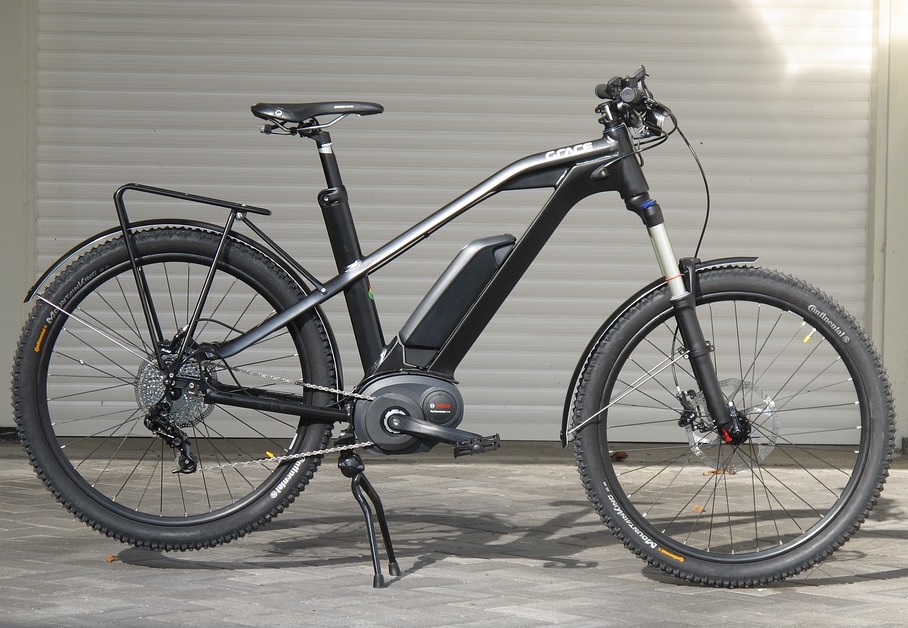
Rear Rack Batteries – rack battery, mounted on the back of the bike, just behind the saddle. This type is usually used in city bikes. Due to their location they have a characteristic glare.
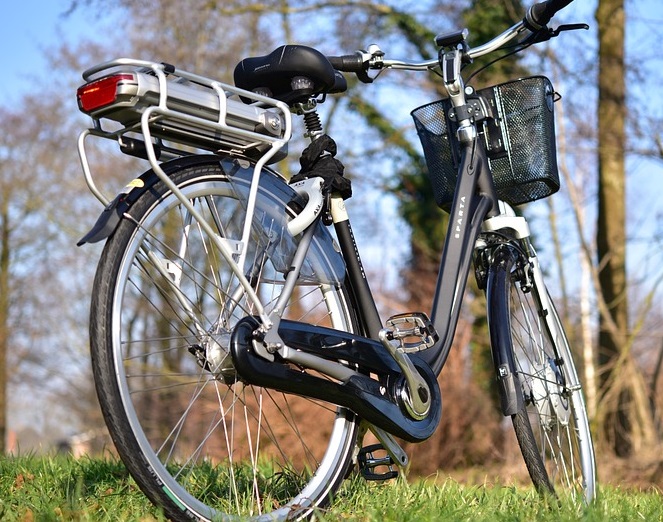
Frog batteries – a battery mounted under the saddle. This is a slightly less common type, usually on smaller bikes. It is most often used in folding bikes.
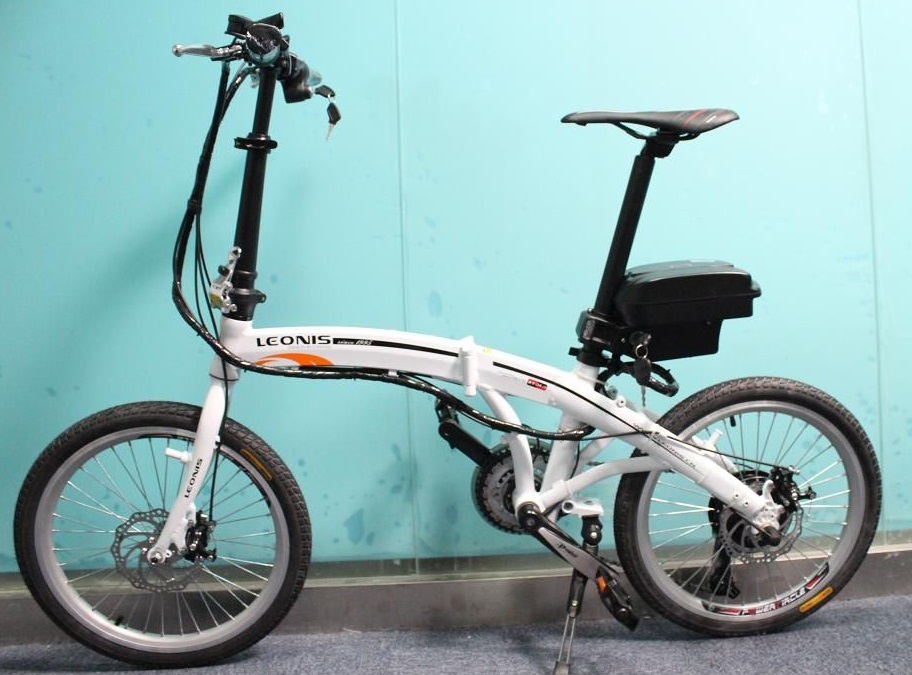
4. The power of the engine and the bike controller
We have to remember that the stronger the engine, the better the acceleration, the more support on the ascent and, consequently, the faster the battery discharge. This issue is not too problematic if we bought a ready-made, legally compliant ebike. In the case of consumer bikes, we are limited by regulations to 250W and 25km/h, because such maximum power can be provided by ebikes. The engine cannot provide more than 250W and will not support the drive if we have already reached 25km/h. Knowing that only in such ranges the engine will work, it is easy for us to judge which battery we need.
The situation is slightly different if we have a custom bike model. Of course, a lot depends on the style of riding, but let’s not fool ourselves if we have a powerful engine, we will certainly want to use its capabilities :). Knowing that our ebike will have high performance it’s worth to consider also buying bigger battery to be able to enjoy this performance longer, but a little more about it in the next point about capacity. Let’s not forget, however, that when testing the bike’s capabilities we shouldn’t put the battery/engine to extreme tests if we don’t have proper protection! The engine will not go out like the combustion engine and damage may occur.
5. What capacity do we need?
There is no obvious answer to this question. Battery capacity depends primarily on our needs and the role that ebike has to play. We have to consider how long distances we want to cover and whether we will subject the bike to greater loads, e.g. riding often on mountainous terrain. The aspects that are most important when choosing the ideal model are the desired range, price and weight of the battery.
Batteries for ebikes are based on very similar cells as batteries for laptops or other mobile devices, so the range of ebikes can be compared to the working time of mobile computers. When we don’t use very intensive, we write emails, read, we’ll get up to 2x better results than if we played the latest Battlefield.
The same goes for bicycle batteries. If we mainly move through hilly city streets, we can deplete the battery after 90 kilometers. However, the same battery will run out after just 45 kilometers of intensive cycling on the Beskid Mountain bike trail.
Below is a table showing the estimated performance of batteries with different capacities and voltages. Another variable is the driving mode, i.e. the degree of support to be provided by the engine. Ebikes usually have two or sometimes three modes. We will focus on two – Eco and Turbo. The Eco mode is designed to save energy, the support is reduced to increase the range of the ride (but it is quiet enough to effortlessly climb hills). Turbo mode, on the other hand, is aimed at making the ascent as easy as possible and significantly increasing acceleration. The values in the table are for constant 250W operation, and it must be taken into account that the range in kilometres also depends on the weight of the user and the luggage he or she carries. When driving on an ebike, the engine does not work all the time, much less at maximum power, so the distance travelled on one charge can actually be much longer.
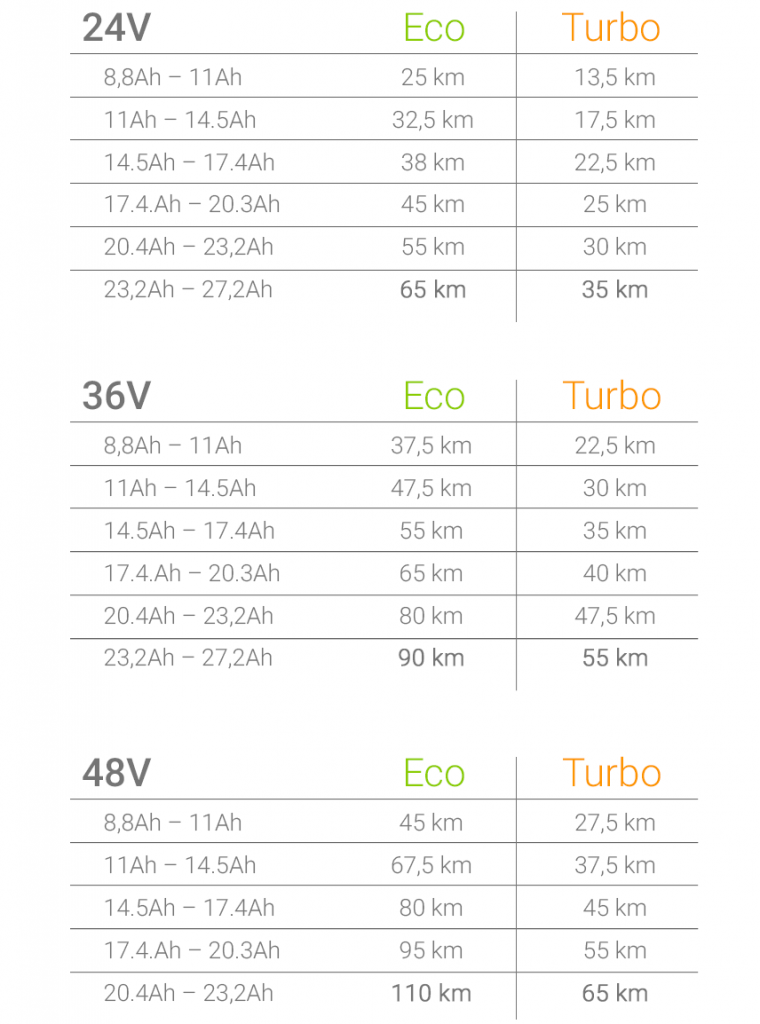
Buying a battery for ebike
If we already know everything about the parameters and type of battery and have decided what capacity the battery needs, let’s find it! First, let’s go to the category of batteries for ebikes in our shop. The batteries you will find there are produced by Green Cell and work on top-class Panasonic cells. These are advanced models with different capacities, mounting types and voltages 24V, 36V and 48V. Batteries work with a wide range of bicycle models from manufacturers such as: Ecobike, Gazelle, Giant, Yamaha, Haibike, Kalkhoff, Lovelec or Prophete.
On the website you will find a set of filters that will help you find the right battery model. If you need additional help, please contact us, we will help you with the selection.
Author: Krzysztof Wołongiewicz
Related posts
Most viewed entries
- Polish Inventors Who Changed the World – Do You Know Them All?
- The Scariest Myths About Electronic Devices – Halloween 2024
- The history of bicycle – International Bicycle Day
- Electricity in a camper van on holiday – a conundrum easily solve
- Off-grid installation on a plot. Is it worth it?
- Charging your electric car at home without a wallbox

